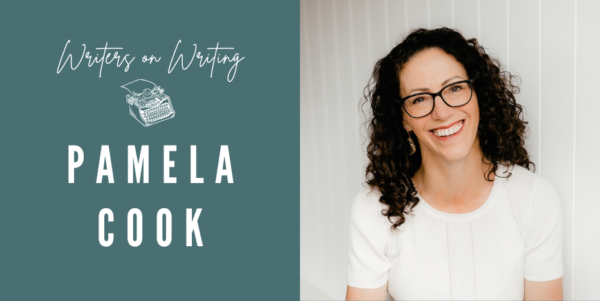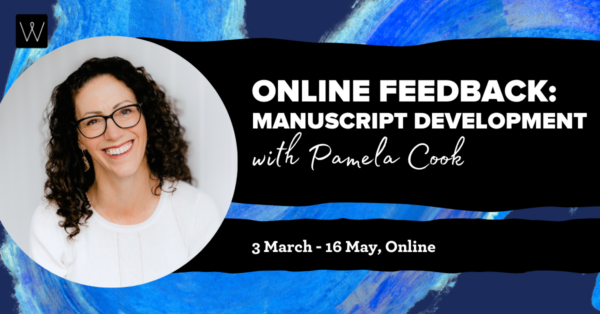
Writers on Writing is our regular conversation with a writer or industry professional about the writing craft, industry insights, and their own practice. This week, we spoke to Pamela Cook about revising and getting feedback on manuscripts to prepare them for publication.
How important is a synopsis when it comes to pitching a manuscript?
While writing a synopsis is, for many authors, an absolute nightmare, having a strong handle on your story before you pitch is crucial. Whether it’s an in-person pitch or an email submission, knowing all the important elements of your story, and being able to condense them down into a short space, will show you have a strong understanding of your plot, characters and theme.
Focus your synopsis on the turning points in your story, keep the spotlight on the protagonist’s change arc, and include only the essential details. Knowing what other books your ideal readers enjoy will help, as will understanding the spine, or essence, of your story.
You’ve had had four traditionally published novels and two independent titles. In your experience, do commercial publishers look for something different from indie publishers?
I’ve learnt so much from my experiences in both the traditional and indie publishing worlds.
Commercial trad publishers are very focused on finding the next big seller — understandably since they’re running a business — and to that end are specific about genre. If they contract you as a crime writer, they want more crime books from you, and if your book sells well, the publisher will definitely want more of the same. They’re also quite focused on high sales in the initial release phase, along with a once-a-year (or close to it) publication schedule.
Indie publishers (who are invariably individuals publishing their books under a business name) don’t have the same overheads as a trad publisher so can be more flexible with their release dates. Self-publishing your own books makes you not only the writer but the overall design coordinator and marketer. It’s a huge learning curve but those who master it can reap the rewards. Many indie authors/publishers stick to one genre as trad authors do, but this form of publishing does allow you to broaden out into other genres and take your readers with you.
Is the act of giving and receiving feedback different when looking at fiction versus nonfiction manuscripts?
Giving and receiving feedback on your manuscript is one of the best ways to learn, and to improve your writing on both a page and structural level. We’re so close to our own work it’s impossible to be objective about our writing. In fiction we fall in love with our characters and sometimes don’t want to make things worse for them, even when it’s needed.
In non-fiction, it’s easy to get caught up in retelling the facts and neglecting the story elements of the writing. Having astute beta-readers who can recognise both what’s working and what’s not helps us strengthen our manuscripts in so many ways. We need to be open to feedback and willing to make changes while also staying true to the story we want to tell. It can be a fine line but one worth walking to create a novel or non-fiction work readers will not be able to put down.
Is there such a thing as overdoing it when it comes to revising and rewriting?
Revising and rewriting are critical parts of the writing process. The mantra ‘writing is re-writing’ is certainly true, whether we revise as we go or power through the first draft and revise later or do a bit of both. You never really know how a story begins until you get to the end, so re-visioning your manuscript on a structural level once that draft is done is the first step. Then comes the hard slog of revising scene by scene until you’re satisfied you can do no more.
All that said, there is such a thing as over revising. We want our writing to be as specific as possible, but we also need to maintain our unique voice. Too much rewriting can sometimes result in that initial spark being lost. And we can also use revision as an excuse to avoid submitting our work, an action usually based on fear. Again, it’s about finding that balance between sufficient revision and accepting there’s only so much you can do to a manuscript at any given point in time.
At what stage in their writing process should a writer seek feedback?
It depends on the stage the writer is at in terms of their writing career. For more experienced writers, seeking feedback on plot points before a draft is completed can help you fine-tune the story line and avoid going off on unnecessary tangents, especially if you’re writing to a contract deadline. But it’s important to get this feedback from a trusted writer buddy who is familiar with your work and understands what you’re trying to achieve. For unpublished authors seeking feedback too early is dangerous – it only takes one small comment, perhaps not even meant as a criticism, to undermine your confidence and get you blocked. For beginning writers my advice is to complete the manuscript, let it rest, revise it to the point where you feel comfortable with someone else reading it, and then share it with carefully selected beta readers. Provide a list of questions you have about the manuscript to give them a framework. When you receive the feedback let it rest for a while before considering which bits work for you. Be open to other ideas but also stay true to your vision.
Pamela Cook is an author, podcaster and teacher who writes stories of longing and belonging, delving deep into the psychology of her characters and the complexity of relationships in all their forms. She has had four novels and two novellas published traditionally, along with two independent titles. Pamela is the host of the Writes4Women podcast and teaches writing workshops through her business, Wildwords, and at various writers’ centres. Her latest full-length release is Out of the Ashes published by Bolinda Audio, and her most recent novella The Christmas Contract is out now as part of A Country Farm Christmas, an anthology published by HQ Harper Collins. She has recently signed with UK publisher Vinci Books.
If you want to be the first to read great advice, prompts and inspiration from our incredible tutors, subscribe to our weekly e-newsletter Newsbite.
More from Writing NSW
Check out our full range of writing courses in Sydney, our online writing courses and our feedback programs to see how we can help you on your creative writing journey. Find out about our competitions and opportunities, as well as writing groups across NSW, and sign up to our weekly newsletter for writing events, opportunities and giveaways.

